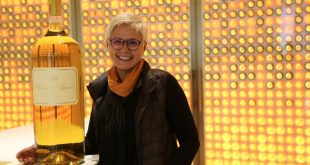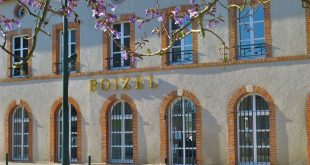

LENG Xinghui, proprietor of Chateau Chanson, was trained in forensic medicine.
‘In forensic medicine, what are the crucial things we do and look for. Performing autopsies. Detecting for poison. Looking for physical evidence such as bloodstains, hair, and DNA. And then performing tests on these evidence. At the time when I was working, the field of DNA was not as advanced as today. Now, all you need is a tiny amount of DNA to conduct a test and get a result,’ Leng reminisced as we looked over a vineyard near the nearly completed new winery he is building.
After studying forensics for five years, upon graduation at 23, Leng Xinghui worked another seven years in a research institute.
During those seven years, Leng performed more than 150 autopsies. Most were criminal cases. Although it seems unrelated to wine, Leng’s academic training and practical expertise, I believe, had a bearing on the next phase of his career when the forensic scientist turned his attention to winegrowing.
(Apart from Chateau Chanson, Leng Xinghui has other businesses including a company that provides transportation for the students of international schools in Shanghai, and an aviation company that specialises in the needs of agriculture and forest fire prevention using planes – the company has 10 of them).

LENG Xinghui may be the most unique Chinese winegrower. After studying forensics for five years, the 23-year young graduate worked seven years in a research institute where he performed more than 150 autopsies. Leng is also unusual amongst Chinese vignerons in that he loves champagne and single malt whiskies.

The winemaking team at Chateau Chanson. From left, Bordeaux consultant Patrick Soye, Chief Winemaker WANG Ping Lai, and Assistant Winemaker GAO Yuan.
Leng Xinghui cuts a suave figure with his tailored suits and tall presence. He is also reflective when he speaks. Leng is also unusual amongst Chinese winegrowers in that, apart from wine, he loves champagne (the other being CHEN Lizhong of Tiansai) and single malt whiskies. Very proud of his daughter, Leng’s mobile phone ID is a photograph of the two of them. Over dinner in Yinchuan – the provincial capital of Ningxia – Leng wondered laughingly what career his daughter would undertake, who had recently graduated from Georgetown University, Washington DC, in literature. I don’t think Leng actually needs look further than the mirror to see that his daughter is cut from the same fabric as her father, a forensic scientist turned vigneron.
Chateau Chanson is a Chinese winery with a difference because, instead of another Ningxia winery focussing on cabernet sauvignon, it is flying the flag proudly for cabernet franc. This, though, was not the original intention.

A new winery by Japanese designer Miura Sakae will be completed at Chateau Chanson by the time you read this. There will also be four guests rooms to cater to visitors, and a Western and Chinese restaurant. Whether from a room or the lounge, there will be sweeping views of the vines surrounding the winery.
‘We thought we were planting cabernet sauvignon. But, it turned out to be cabernet franc. It was a “beautiful mistake” because the variety is doing so well,’ confessed Leng Xinghui.
This, I think, is irrefutable proof that Leng Xinghui’s previous professional life has influenced his judgement. In forensics, you look for physical evidence and then analyse that evidence. You make connections between the evidence you have gathered, reflecting on how they link into each other. When Leng Xinghui discovered that what he had planted was cabernet franc and not sauvignon, he did not abandon the former. Instead, he tasted the wine produced from cabernet franc and discovered it was very good. To put it in another way, Leng went with the evidence. He is that confident and committed.
Chateau Chanson has 165 hectares of vines. These are planted to cabernet franc, cabernet sauvignon, cabernet gernischt (aka carmenere), pinot noir, shiraz, merlot, marselan, and chardonnay. Cabernet franc represents half of the vineyard. Eighty percent of the vines were planted in 1997. The first vintage of Chateau Chanson was as recent as 2017. Before that, the fruit was sold to other wineries including Helan Qing Xue Jiabeilan and Pernod Ricard’s Helan Mountain.
‘We are going to cooperate with Northwest A&F University. They are researching and making trials what other varieties may suit the terroir of Chateau Chanson. Where we are standing now, you see some empty plots in front of us. These will be planted with what the university will recommend us,’ Leng informed.
The soil at Chateau Chanson is alluvial, sandy soil from the Yellow River. Although it rains more in Ningxia than in Xinjiang, water is still a precious, scarce commodity and wineries are able to use water from the Yellow River to irrigate. The vineyard is organic and Chateau Chanson harvests entirely by hand. If you are wondering how the estate got its name – “Chanson” or “Song” in French – look no more than at the vineyard of the Ningxia property. See what – from a distance – the rows of trellised vines appear like. Do they resemble a musical score? Play on Chateau Chanson.




